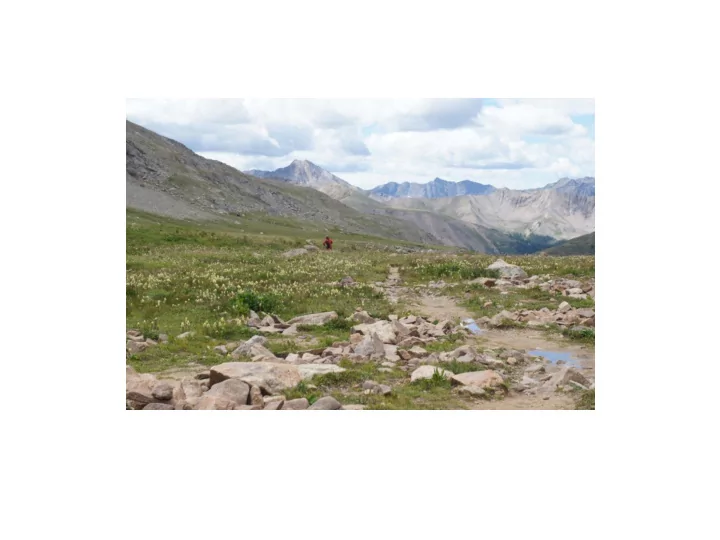

Managing Mountains for Ecological Services and Environmental Security Ruth Greenspan Bell Public Policy Scholar – Woodrow Wilson International Center for Scholars
The Challenge • Control greenhouse gas emissions. • Preserve functions we expect mountains to serve – water towers for • downstream populations (irrigation, industry, hydropower, and freshwater) • lower elevation ecosystems – carbon sequestration and climate regulation, and – preserving biological diversity • What would it take to get serious focus, resources and attention?
in the absence of a will for action • issue a declaration • hold a conference • form a committee Problem is: there have been plenty of all of these.
Paved with Good Intentions: Existing Declarations, Resolutions, Statements, Organizations; Relevant Parts of Other Conventions UIAA (International Mountaineering and Climbing Federation) ( preserving mountain environments) • General Assembly –Environmental Objectives and Guidelines (“ the enormous value of mountain areas as reservoirs of biological diversity… spectacular – natural phenomena associated with climate and geology….. often the source of products essential to humankind as a whole”) Kathmandu Declaration, October 1982 ( urgent need for effective protection of the mountain environment and landscape; …. The flora, fauna and natural – resources of all kinds need immediate attention, care and concern .”) Declaration of Caceres, May 1995 (free mountain access to continue practicing sports activities in a responsible way, in keeping with UIAA guidelines – Resolution on Climate Change, October 2006 – General Assembly Mountain Ethics Declaration, October 2009 (“..practice our activities in an environmentally sensitive way ..be proactive in preserving – nature and the landscape .”) Tyrol Declaration (Future of Mountain Sports Conference, September 2002) (“Protect the wild and natural character of mountains and cliffs; Support local • communities and their sustainable development .”) Mountain Wilderness – (wilderness values include promote environmental sensitivity among young people, “foster naturally and culturally respectful development • of mountain regions , … ensure sustainable future for those who choose to live there.”) Biella Thesis – influx of expeditions causing degradation of Alps and other ranges , destabilizing effect on traditional societies unprepared to deal with – them. Statement by Group of Mountain Wilderness Guarantors – May 2009 (mountaineering safety) • FEDME 2005 seminar: Contribution of Mountaineering to Sustainable Development in the Natural Environment • Declaration of Gredos , Congress of Mountain Professionals working in Protected Natural Areas , May 2008 (climate change impacts: freshwater to half the world’s • population, exposure to multiple risks; harbor threatened global biodiversity; home to people subject to food insecurity). UN Conference on Environment and Development, Chapter 13, Agenda 21, Rio, 1992: role of mountains in global sustainable development • International Year of Mountains (2002) Johannesburg Plan of Implementation & establishment of Mountain Forum and Mountain Partnership (references • poverty, vulnerability and economic and social insecurity, and climate change ) International Conference on Green Economy and Sustainable Mountain Development, Kathmandu, September 2011. • Relevant parts of other conventions: • Convention to Combat Desertification • Convention on Biological Diversity • Framework Convention on Climate Change (references special vulnerability of “fragile mountain ecosystems.”) • 1972 World Heritage Convention • 1968 African Convention on the Conservation of Nature and Natural Resources • Regionally specific agreements (Alpine Convention, draft agreements on Altai range, Caucasus, Carpathian. •
Do We Need a Mountain Convention? • Yes: global focus for global problem • No: – long timetable for negotiation; – Inevitably, too many issues get joined; – likelihood of US ratification is remote; – negotiation process becomes a lightening rod – poor track record of actual change coming out of vast body of international environmental agreements
The Argument for Bottom Up, Looser Alliances and Experience Sharing yes • More nimble • Smaller failures are not catastrophic • Potential to build unlikely coalitions & alliances No • Belief in need for comprehensive solutions • Funders tend to like “big”
Recommend
More recommend